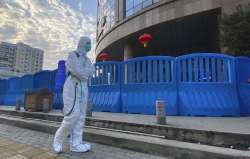COVID-19 origin through laboratory incident 'extremely unlikely': WHO report
A total of 34 experts from the WHO and China jointly conducted 28-day research from January 14 to February 10 in Wuhan, China, Xinhua news agency reported.

The World Health Organization (WHO) on Tuesday released a report on the global tracing of Covid-19 origins, following joint research with China on issues including the pathways of the virus and future investigation in different countries.
A total of 34 experts from the WHO and China jointly conducted 28-day research from January 14 to February 10 in Wuhan, China, Xinhua news agency reported.
They made an assessment of the likelihood of possible pathways.
According to the report, Covid-19 introduction through an intermediate host is "likely to very likely," introduction through cold/food chain products is "possible," and introduction through a laboratory incident is "extremely unlikely".
China believes that the joint research will play a positive role in promoting global cooperation in Covid-19 origin tracing, a Chinese Foreign Ministry spokesperson said on Tuesday.
14 countries raise concerns over WHO, China joint report on COVID-19 origin
Meanwhile, a group of 14 countries including the United States and Japan has raised concerns over the report on the origins of COVID-19 by WHO and China, arguing that the WHO team was "significantly delayed and lacked access to complete, original data and samples." The report pointed to the transmission from bats to another animal and subsequently to humans as the most likely way the pandemic began.
The United States, Australia, Canada, the Czech Republic, Denmark, Estonia and Israel said in a statement that they "fully" supported the WHO's efforts to bring an end to the pandemic, including understanding how it "started and spread".
But they added it was "essential that we voice our shared concerns that the international expert study on the source of the SARS-CoV-2 virus was significantly delayed and lacked access to complete, original data and samples".
Japan, Latvia, Lithuania, Norway, the Republic of Korea, Slovenia and the United Kingdom also co-signed the statement.
The review, which was conducted by a WHO team of international experts in Wuhan, China, between January 14 and February 10, is considered a first step in what will likely become a years-long investigation into the virus' origins.
Separately on Tuesday, WHO's Director-General Tedros Adhanom Ghebreyesus also demanded further research to reach "more robust conclusions", Al Jazeera reported.
"I do not believe that this assessment was extensive enough," he said during a news briefing on Tuesday.
"Although the team has concluded that a laboratory leak is the least likely hypothesis, this requires further investigation, potentially with additional missions involving specialist experts, which I am ready to deploy," Tedros added.
China has been criticised widely across the world for its alleged role in the spread of the novel coronavirus that has infected over 127 million people across the world. More than 2.79 million people have lost their lives to the virus, as per Johns Hopkins University.